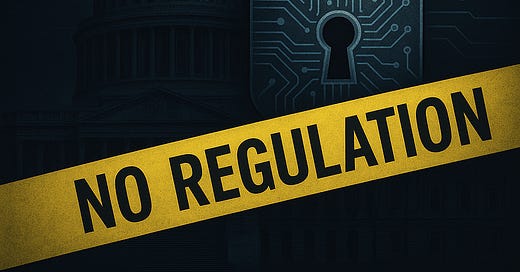Special Edition: A Hidden Attack on AI Regulation You Need to Know About
How a hidden provision in Congress could freeze all AI oversight for a decade - and what it means for schools, libraries, and democracy.
Jay Kuo recently flagged a deeply troubling report from 404 Media about a provision Republican lawmakers are quietly trying to insert into the federal budget reconciliation bill. The language would effectively ban both the federal government and all state and local governments from regulating AI for the next ten years.
Here’s the language buried in the bill:
“…no State or political subdivision thereof may enforce any law or regulation regulating artificial intelligence models, artificial intelligence systems, or automated decision systems during the 10-year period beginning on the date of the enactment of this Act.”
I want to be clear: I use AI almost every day. It helps me edit this very newsletter, generate lesson ideas, and streamline my workflow. I’ve long believed that AI has both good and bad sides—and that its potential for supporting educators and librarians is real.
But that doesn’t mean it should be a lawless free-for-all.
We need smart, thoughtful regulation—especially around things like deepfakes, copyright, algorithmic bias, and the use of AI in public services like education. This bill would not only block federal protections, it would also prevent state governments, local governments, and even school districts and local boards of education from enacting any rules about AI. That means district-level policies around student data privacy, the use of AI-generated content, or safeguards in school software could all be rendered unenforceable.
Why This Is So Dangerous—for All of Us:
It handcuffs every level of government. From local school boards to state attorneys general to federal agencies, no public institution would be able to regulate or respond to harms caused by AI—no matter how urgent or damaging.
It blocks essential safeguards. Without the ability to regulate, there will be no oversight on how AI tools are used in hiring, education, healthcare, policing, or elections. Discriminatory algorithms? Deepfakes? Data exploitation? All beyond the reach of law.
It strips away democratic control. Elected officials at every level would be banned from protecting their communities from harmful or unethical AI systems, no matter the consequences.
It directly affects libraries and schools. With no legal framework, AI tools used in classrooms, public libraries, and educational platforms could be adopted without transparency, ethical guardrails, or accountability, risking student privacy, fairness, and safety.
If This Passes, What Does It Mean?
It means we would enter a decade-long AI free-for-all—one where corporations can innovate and deploy at will, and neither federal nor state governments can act. It would make the U.S. one of the only countries in the world to legally prohibit AI oversight.
One clarification:
This ban would apply only to public regulation—federal, state, and local governments (including school boards) would be legally barred from regulating AI in any way for a decade. It does not prevent private companies from creating their own internal policies. But without enforceable laws, there would be no way to hold them accountable for misuse, harm, or abuse.
What Can You Do?
Call your representatives—Senators and House members—now. Tell them you oppose the AI regulation ban.
Raise awareness. Share this post and the 404 Media article in your networks.
Join with educators, librarians, and digital rights advocates to demand responsible AI policy, not deregulation disguised as budget legislation.
AI is already shaping our lives. Banning regulation doesn’t protect innovation—it protects exploitation. We need to act before it’s too late.
Let me know your thoughts in the comments below.





I too have misgivings about such a piece of legislation; it sounds odd at best. However, there are more than sufficient tort laws to deal with private companies which cause harm.